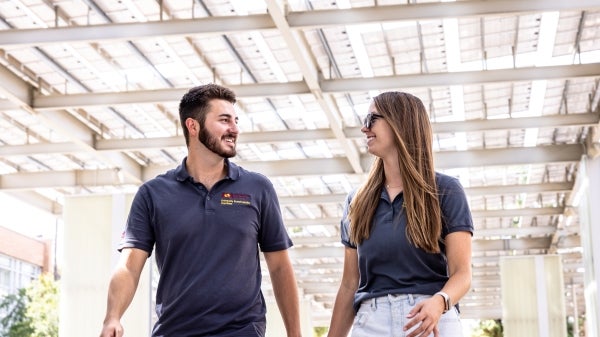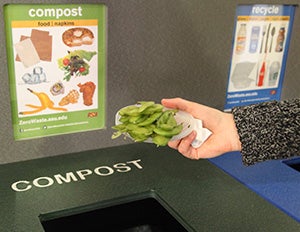Compost station opens on ASU Tempe campus for Memorial Union customers

The Tempe campus Memorial Union's new compost station is a partnership between the MU, Aramark and ASU Zero Waste, to help increase the diversion rate of waste sent to the landfill.
Food waste from retail dining eateries at the Memorial Union can now be composted at the new MU Zero Waste Station. The new compost station launches Jan. 11.
Arizona State University launches a new compost station at the Tempe Memorial Union (MU) on Monday, Jan. 11, that allows customers to compost organic materials.
“Extending composting to retail dining locations is an effort to capture post-consumer retail food waste and to educate students about waste diversion,“ said Krista Hicks, sustainability manager for Aramark, the MU's food-service provider. “The new MU Zero Waste Station is yet another way that the university community can contribute to ASU’s zero-waste goals.”
The compost station is a partnership between the MU, Aramark and ASU Zero Waste, to help increase the diversion rate of waste sent to the landfill.
Zero Waste estimates that retail dining locations produce eight times more waste compared with other ASU operations. Zero Waste ambassadors will assist customers in sorting their waste for two weeks from Jan. 11 – 22. Students, faculty and staff who use the compost station during those two weeks also will have the opportunity to enter a daily-prize raffle for a bicycle and items from TerraCycle, a New Jersey-based company that repurposes difficult-to-recycle items and materials.
Compost by the numbers
According to Aramark, an estimated 15,000 customers frequent the MU’s retail eateries each day. Approximately 4.6 tons of waste are collected each week, and more than 138 tons of food waste are generated every academic year.
Students, faculty and staff may place food scraps and paper food-service items in the green compost bin located at the north end of the MU on the first level. Compostable items from retail dining locations such as Einstein’s Bagels, Pei Wei, Chick-Fil-A and the P.O.D. markets include:
• All food (including dairy and meat products)
• All paper food-service items (including boats, clamshells, napkins and cups)
The only other Tempe campus locations where front-of-house composting is available include the University Business Services Building and Wrigley Hall.
“We hope to encourage individuals to slow down, consider the impact of their waste and sort their waste accordingly to minimize the negative effects and maximize the positive impacts,” said Josh Ellner, ASU Zero Waste program manager.
Since July 2014, the MU has featured back-of-house composting for its dining operations. Food-service workers empty all compost bins and ensure that each load contains only small amounts of contamination. If a load is more than 10 percent contaminated, it is unable to be composted and sent to the landfill.
“Bringing back-of-house composting to dining halls was a great starting point because food-service areas are very controlled spaces and have very low levels of contamination,” Ellner said. “Due to the nature of the compostable material, small amounts of contamination can ruin an entire load of compost or degrade the final product, which is compost that may serve as a soil amendment for gardens or flower beds.”
Faculty and staff interested in composting may attend a Zero Waste event or host a green event.
More Environment and sustainability

Charles Redman, founder of the School of Sustainability, faces a new adventure: Retirement
At the retirement celebration for Charles Redman on Oct. 22, two messages persisted: Redman’s contributions to Arizona State…

10 climate insights to guide our future
A group of globally renowned social, natural and climate scientists has once again convened to offer their newest annual…

The future is green: Job demand translates to high employability for ASU sustainability grads
A 2023 report by Forbes on the state of green jobs confirmed what Arizona State University has been trumpeting for years:…
